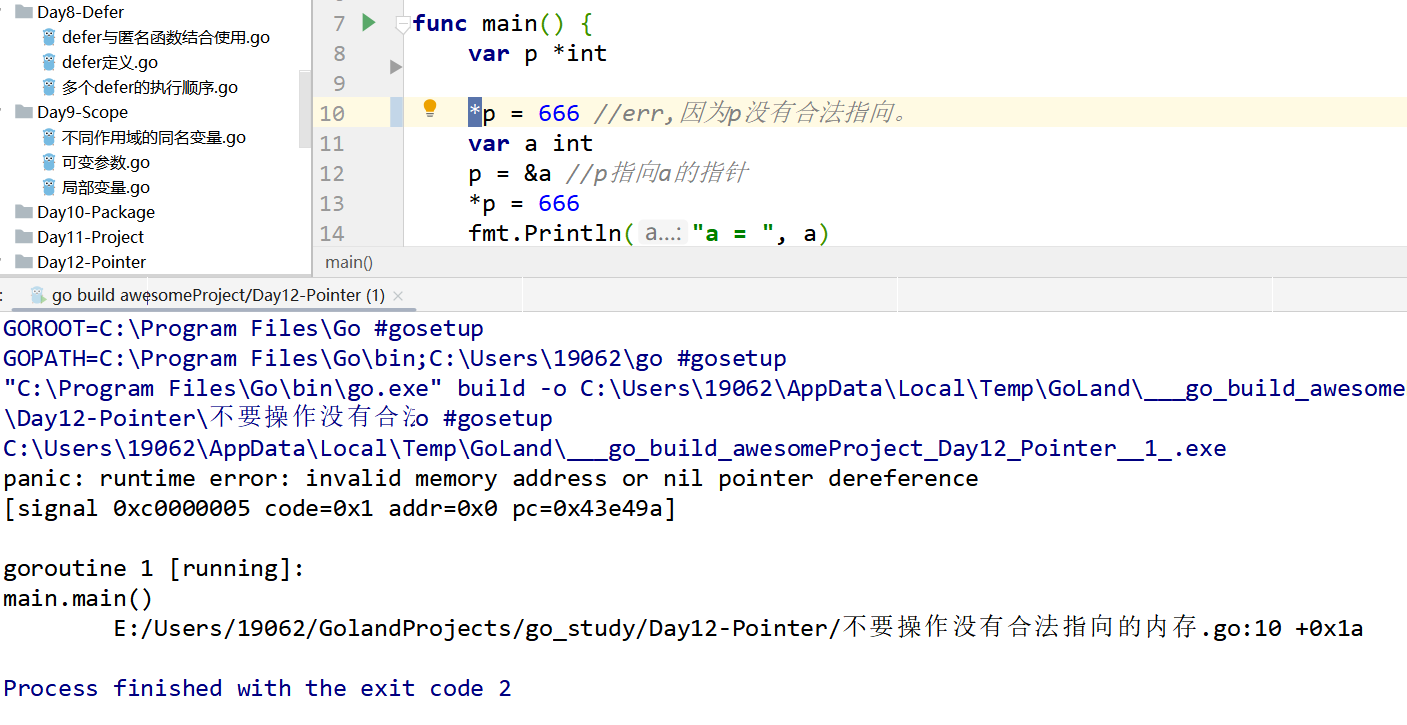
风离不摆烂学习日志 Day7 Go 指针
AI-摘要
Tianli GPT
AI初始化中...
介绍自己
生成本文简介
推荐相关文章
前往主页
前往tianli博客
风离不摆烂学习日志 Day7 Go 指针

指针概念
指针是一个代表着某个内存地址的值。
这个内存地址往往是在内存中存住的两一个变量的值的起始位置。Go语言对指针的支持介于Java语言和C/C语言之间,它既没有像Java语言那样取消了代码对指针的直接操作的能力,也避免了C/C语言中由于对指针的滥用而造成的安全和可靠性问题。
Go语言虽然保留了指针,但与其他编程语言不同的是:
- 默认值nil,没有NULL常量。
- 操作符"&“取变量地址,”*"通过指针访问目标对象。
- 不支持指针运算,不支持"->“运算符,直接用”."访问目标成员。
package main
import "fmt"
func main() {
var a = 10
//每个变量有2层含义,变量的内存和变量的地址
fmt.Printf("a = %d\n", a) //a,变量的内存,也就是存在内存当中的内容
fmt.Printf("&a = %v\n", a) //&a,变量的地址,也就是内存所在内存当中的位置,也叫指针
}
重要 不要操作有合法指向的内存 (Java空指针)

panic: runtime error: invalid memory address or nil pointer dereference
这类错误以后很常见 即空指针
package main
import "fmt"
func main() {
var p *int
*p = 666 //err,因为p没有合法指向。
var a int
p = &a //p指向a的指针
*p = 666
fmt.Println("a = ", a)
}
举个实战具体的例子
/**
返回值类型为 *model.School
我们 不能直接在
err := common.DB.First(&school, "school_name = ?", schoolName).Error 会空指针异常 因为还没关联上地址
//给 school 关联上 copySchool
school = ©School
*/
func (sr SchoolRepository) SelectBySchoolName(schoolName string) (*model.School, error) {
common.Log.Info("Db 层 取到的schoolName ", schoolName)
//这里写查询语句
var school *model.School
var copySchool model.School
//给 school 关联上 copySchool
school = ©School
//查询
err := common.DB.First(&school, "school_name = ?", schoolName).Error
common.Log.Info("err : ", err)
if err != nil {
return nil, errors.New("找不到该学校")
}
common.Log.Info("school ", util.Struct2Json(&school))
return school, err
}
interface{} 转 string 工具类
// Strval 获取变量的字符串值
// 浮点型 3.0将会转换成字符串3, "3"
// 非数值或字符类型的变量将会被转换成JSON格式字符串
func Strval(value interface{}) string {
var key string
if value == nil {
return key
}
switch value.(type) {
case float64:
ft := value.(float64)
key = strconv.FormatFloat(ft, 'f', -1, 64)
case float32:
ft := value.(float32)
key = strconv.FormatFloat(float64(ft), 'f', -1, 64)
case int:
it := value.(int)
key = strconv.Itoa(it)
case uint:
it := value.(uint)
key = strconv.Itoa(int(it))
case int8:
it := value.(int8)
key = strconv.Itoa(int(it))
case uint8:
it := value.(uint8)
key = strconv.Itoa(int(it))
case int16:
it := value.(int16)
key = strconv.Itoa(int(it))
case uint16:
it := value.(uint16)
key = strconv.Itoa(int(it))
case int32:
it := value.(int32)
key = strconv.Itoa(int(it))
case uint32:
it := value.(uint32)
key = strconv.Itoa(int(it))
case int64:
it := value.(int64)
key = strconv.FormatInt(it, 10)
case uint64:
it := value.(uint64)
key = strconv.FormatUint(it, 10)
case string:
key = value.(string)
case []byte:
key = string(value.([]byte))
default:
newValue, _ := json.Marshal(value)
key = string(newValue)
}
return key
}
本文是原创文章,采用 CC BY-NC-ND 4.0 协议,完整转载请注明来自 程序员风离
评论
匿名评论
隐私政策
你无需删除空行,直接评论以获取最佳展示效果

